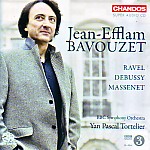This stunning and generous collection belongs right at the top of the heap in its respective repertoire. The Debussy is still a comparative rarity in concert if not on disc, a remarkable fact given that it’s wholly gorgeous from first note to last. Jean-Efflam Bavouzet’s excellence as a Debussy pianist already has been acknowledged by just about everyone who has heard him, and needs no further advertisement here. The performance is outstanding, sensitive to every nuance, but also very French in its clear-eyed sensibility and understanding that focused rhythm and supple tempos prevent the music from turning excessively sentimental or blandly pretty. And in Tortelier, Bavouzet has a conductor who seconds him every step of the way.
A similar sensibility informs these swift, razor-sharp, and utterly thrilling accounts of the two Ravel concertos. That for the left hand seldom has sounded so exciting, or in its jazzy central march section, so sinister. Listen to the bite that both soloist and orchestra bring to that descending scale theme, and notice the way Bavouzet shapes his cadenza so as to preserve the illusion of multiple parts played by multiple hands–all without slowing down at the tough passages. It’s really an amazing performance by any standard. Even the dark opening, often merely murky on other recordings, has shape and urgency, the buildup to the initial entry of the piano creating incredible tension.
The G major concerto probably has more lousy performances to its credit than any other major 20th century piano concerto (save perhaps Gershwin’s). Most of the time the problems start right from the solo entry in the first movement after the initial orchestral tutti, and the reason is easy to describe. This movement is in sonata form, and it has two basic tempos: “allegramente” for the opening, and “meno vivo” for the transitional material and second subject. Now obviously, “meno vivo” isn’t all that much slower, but it’s often taken at close to adagio by pianists anxious to wring “expression” out of the music at all costs. This is all the more absurd when we note that in the recapitulation, “meno vivo” briefly gives way to andante for the ethereal harp cadenza and horn solo. So Ravel’s intentions aren’t mysterious.
The best performances, then, to make a long story short, keep the tempo going with relative steadiness however much rubato and inflection happens along the way. Bavouzet gets it absolutely right, following up with one of the most songfully flowing and elegantly shaped accounts of the Adagio on disc, and concluding with an absolutely scorching finale. The Massenet encores are both novel and delightful, bringing the playing time up to a hefty 77 minutes. The SACD sonics are terrific, featuring well-nigh perfect balances and flattering the enthusiastic playing of the BBC Symphony (the real one, not the usual Philharmonic). This release is a “must” if you care about any of this music, and a first choice if you’re newly in the market. [11/22/2010]
































